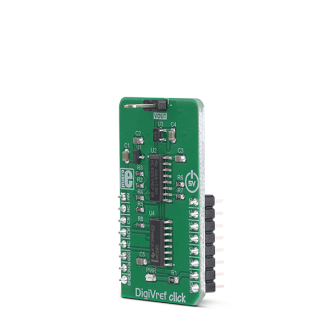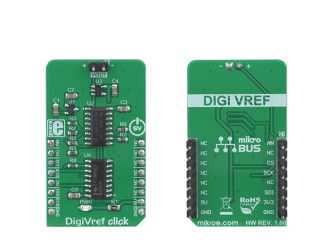
We strongly encourage users to use Package manager for sharing their code on Libstock website, because it boosts your efficiency and leaves the end user with no room for error. [more info]

Rating:
Author: MIKROE
Last Updated: 2019-02-13
Package Version: 1.0.0.0
mikroSDK Library: 1.0.0.0
Category: Measurements
Downloaded: 5123 times
Not followed.
License: MIT license
DigiVref click is a very precise voltage reference Click board, which allows one of four different voltage values to be selected over the SPI interface.
Do you want to subscribe in order to receive notifications regarding "DigiVref click" changes.
Do you want to unsubscribe in order to stop receiving notifications regarding "DigiVref click" changes.
Do you want to report abuse regarding "DigiVref click".


Library Description
The library contains a function for setting a reference output voltage which can be 1030mV, 2046mv, 3070mV or 4096mV.
Key functions:
void digivref_setOutputVoltage( uint8_t Vref ) - Function for set reference output voltageExamples description
The application is composed of the three sections :
void applicationTask()
{
digivref_setOutputVoltage( _DIGIVREF_REF_VOLTAGE_4096mV );
Delay_ms( 3000 );
digivref_setOutputVoltage( _DIGIVREF_REF_VOLTAGE_3070mV );
Delay_ms( 3000 );
digivref_setOutputVoltage( _DIGIVREF_REF_VOLTAGE_2046mV );
Delay_ms( 3000 );
digivref_setOutputVoltage( _DIGIVREF_REF_VOLTAGE_1030mV );
Delay_ms( 3000 );
digivref_setOutputVoltage( _DIGIVREF_REF_VOLTAGE_2046mV );
Delay_ms( 3000 );
digivref_setOutputVoltage( _DIGIVREF_REF_VOLTAGE_3070mV );
Delay_ms( 3000 );
}
Other mikroE Libraries used in the example:
SPIAdditional notes and information
Depending on the development board you are using, you may need USB UART click, USB UART 2 click or RS232 click to connect to your PC, for development systems with no UART to USB interface available on the board. The terminal available in all MikroElektronika compilers, or any other terminal application of your choice, can be used to read the message.